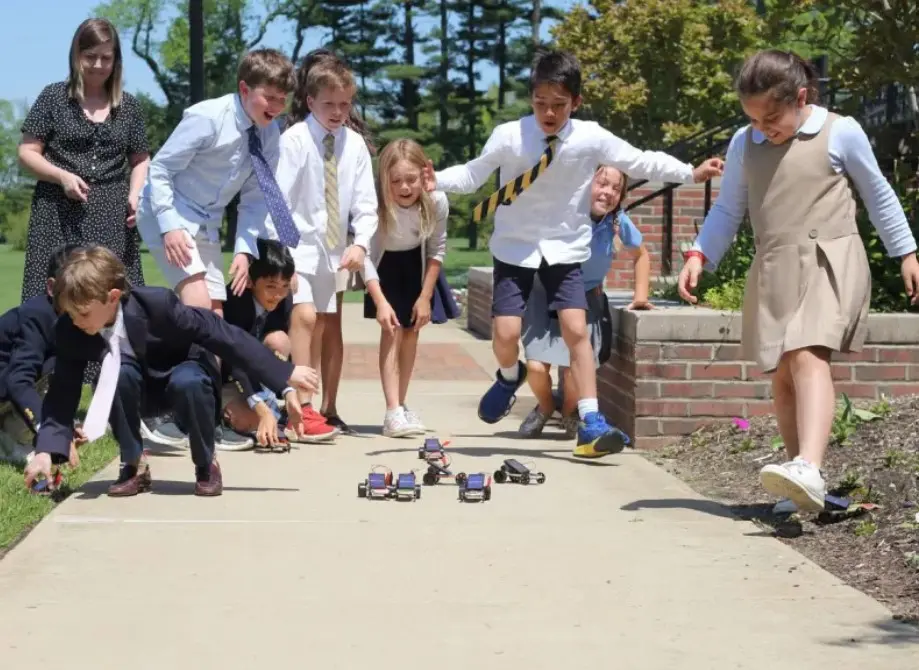When you think of learning, what comes to mind? Textbooks, tests, and structured classrooms? While these are traditional aspects of education, research has shown that some of the most powerful learning happens in a more relaxed setting—through play. The phrase “learning through play” might sound simple, but it is an essential concept in childhood development, with far-reaching benefits that shape a child’s cognitive, social, and emotional growth.
Play is often seen as something kids do to pass the time, but it’s much more than that. Play is a natural, active, and incredibly effective way for children to learn. The environment created through play fosters imagination, problem-solving skills, social interaction, and much more. Here’s how the power of play helps fuel learning for kids.
1. Enhances Cognitive Skills
One of the most immediate benefits of play is the stimulation of cognitive abilities. Games that require memory, attention, and decision-making sharpen a child’s brain. Whether it’s building a puzzle, playing with blocks, or navigating a board game, each activity engages different areas of the brain, promoting cognitive growth.
For example, playing games like “Simon Says” or “Memory Match” not only develops a child’s memory and focus but also enhances their ability to follow instructions and think critically. Similarly, activities like role-playing or interactive story-building improve vocabulary, comprehension, and abstract thinking. When kids engage in imaginative play, they exercise their brains by developing problem-solving strategies and learning cause-and-effect relationships.
2. Fosters Social and Emotional Development
Learning through play is not just about the mind—it also nurtures emotional intelligence and social skills. Cooperative play encourages children to share, negotiate, and communicate with others, helping them develop empathy and conflict-resolution strategies. Through games that involve multiple players, kids experience how to handle success and failure, taking turns, and collaborating to achieve a common goal.
Consider a group of children playing dress-up together. They create characters, decide on roles, and work together to build a scenario. This process teaches not only teamwork but also emotional expression and recognition of others’ feelings. Through play, children learn to read social cues, interpret body language, and manage their emotions in various settings. It’s during these moments that kids practice self-regulation—learning how to express their feelings appropriately in both positive and negative situations.
3. Boosts Language Development
Play serves as a powerful language-learning tool. When children engage in pretend play, they often imitate real-world scenarios such as being a teacher, doctor, or chef. This type of play introduces new vocabulary and phrases, enriching a child’s language skills. Furthermore, when children engage in conversations with peers or adults during play, they practice their listening skills and refine their ability to express themselves clearly.
Building a house out of blocks, for instance, can spark conversations about architecture, dimensions, and shapes. By engaging in dialogues around their play, children internalize new words and concepts while having fun. Even simple activities like reading picture books together or storytelling exercises foster literacy and comprehension skills. In fact, a study conducted by the American Academy of Pediatrics found that children who engage in more play, especially imaginative play, develop better language skills over time.
4. Stimulates Creativity and Imagination
Play opens the door to limitless creativity. Whether it’s crafting a new world with Legos or drawing a picture of their dream home, play encourages children to think outside the box and explore their imagination. It allows them to envision possibilities and express their ideas freely.
In a world where kids are constantly exposed to digital devices and screen time, it’s vital to give them the space and time to be creative. Through free play, children can create their own rules, scenarios, and stories—this boosts their ability to think critically and inventively. Whether playing with dolls, building intricate structures, or making art, each activity nurtures original thought and cultivates a child’s innate creativity.
5. Develops Physical Skills and Coordination
Play also helps children develop essential motor skills. Physical activities such as running, jumping, or playing with a ball enhance their coordination, balance, and muscle strength. Fine motor skills, which involve smaller movements, are refined through activities like drawing, cutting with scissors, or playing with small building toys like Legos.
As children engage in physical play, they become more aware of their bodies and learn how to control their movements. Active play promotes physical health, boosting endurance and muscle strength. Additionally, as kids refine their coordination through activities like dancing or sports, they gain confidence in their physical abilities, which supports a positive self-image.
6. Promotes Positive Behavioral Traits
Play is more than just a fun diversion—it also encourages positive behaviors such as patience, perseverance, and responsibility. Games that have a set structure, like board games or team sports, require children to wait their turn, follow rules, and demonstrate fairness. Through these activities, children learn how to manage frustration when things don’t go their way and develop the persistence needed to keep trying.
Many types of play also help build problem-solving skills. For example, completing a challenging puzzle or figuring out how to use a toy in an unexpected way requires persistence and creativity. Overcoming obstacles in a game teaches resilience, a valuable life skill that will help children throughout their academic and personal lives.
In Conclusion
Incorporating play into a child’s everyday routine goes beyond just being a fun activity—it’s a crucial component for nurturing their overall growth and development. The benefits of play extend to cognitive, social, emotional, and physical development, offering a well-rounded approach to learning. By embracing play, parents, caregivers, and educators—such as those at daycares in areas like Flowing Wells, Tucson—can create environments where children not only enjoy themselves but also develop essential skills and knowledge for their future success. Play forms the foundation of learning, and when children are given the freedom to play, they engage in one of the most enjoyable and effective forms of learning.
Also Read-Revolutionizing Digital Content with AI Video Face Swap Technology


